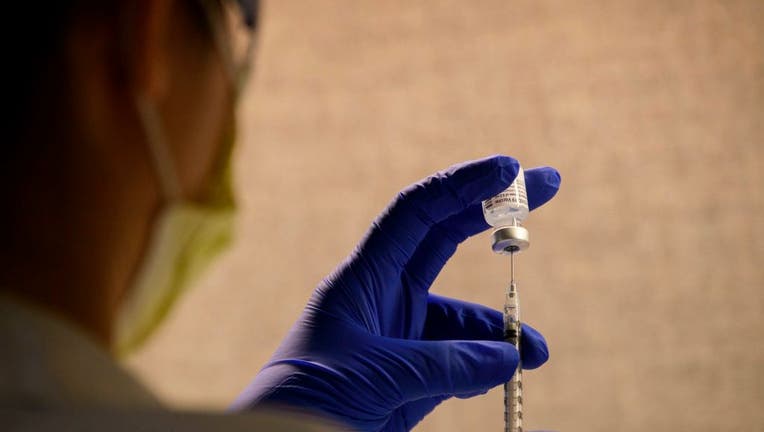Union calls for equitable vaccine distribution plan that addresses frontline workers, impacted communities

A pharmacist fills a syringe to prepare a dose of the Pfizer-BioNTech COVID-19 vaccine for frontline health care workers at a vaccination site at Torrance Memorial Medical Center on Dec. 19, 2020 in Torrance, California. (Photo by PATRICK T. FALLON/A
SAN FRANCISCO - Union leaders representing San Francisco health care workers on Wednesday urged the city to come up with an equitable plan to distribute the COVID-19 vaccine to those most at-risk, including all frontline workers and communities of color.
The city received its first units of the Pfizer vaccine last week as part of an initial 12,675 doses from the state and federal government, and has already vaccinated registered nurses, doctors and paramedics.
But according to Service Employees International Union Local 1021, the city has yet to provide a detailed plan on how it will distribute the vaccine among other frontline workers who have direct contact with the public, including certified nursing assistants, licensed vocational nurses, and bedside nurses.
Union leaders are also calling for the plan to prioritize essential workers, like San Francisco Municipal Transportation Agency bus operators, as well as the city's Black and Latino communities, as members of those communities often work essential jobs and continue to see high numbers of cases.
"As workers across the country are demanding that elected leaders and employers respect us and protect us, we demand that the health and safety of every worker be assured through the distribution of safe, reliable and widely-accessible vaccine. We also demand that the distribution be done through the lens of diversity, equity and inclusion, with sensitivity to cultural challenges that Black and brown people have faced historically in health care," said SEIU Local 1021 President Theresa Rutherford.
Supervisor Ahsha Safai said, "Through education and access and ensuring that those that are the most impacted, like the Black community and the Latinx community and others hardest hit from this, we should do an extra job of educating and making this accessible to them. And that's how it should be in the initial phases."
"I'm such a believer that this will help all of us, and not only help you workers, and the people you serve, and also your families," Board of Supervisors President Norman Yee said, addressing frontline workers. "Deeply, we appreciate you."
District 7 Supervisor-elect Myrna Melgar, who will assume office next week, replacing Yee, also offered her support in urging the city for a detailed distribution plan.
"I will commit to making sure we work together on the Board of Supervisors to support you and ensure that we have proper staffing levels and that those things that are essential to our survival and wellness are supported," Melgar said.
"Vaccines are a proven technology, and the rollout can be scary," said Local 1021 Vice President of Organizing Jennifer Esteen.
"We want to make sure that vaccine distribution plans continue to be tiered and structured in a way that health care workers, essential workers and frontline workers of all stripes have first access. It doesn't matter if you're a bus driver or a nurse. If you have access to the public, you should be getting this vaccine before anyone else," she said.
Under the state's vaccine prioritization plan, those first in line to get the vaccine includes health care workers at hospitals, long-term care facilities, outpatient clinics, pharmacies, paramedics, public health staff and home health care workers. Residents at long-term care facilities like skilled nursing clinics and assisted living facilities would also have first access under the state's plan.
In response to the union's demands, Mayor London Breed said in a statement that she is currently working with city agencies on an equitable distribution plan.
"For months, we have depended on our healthcare workers and members of communities who are disproportionately impacted by COVID-19 to serve on the frontlines to fight against it," she said. "Finally we have a safe and effective vaccine to further protect those individuals who will continue to bravely fight for our residents and families. I am working closely with our city agencies including the COVID Command Center, the Department of Public Health, the Department of Human Resources, and the Human Rights ]Commission to ensure that health care workers and others in the top tiers of the prioritization plan have priority access to the long-awaited vaccine."

